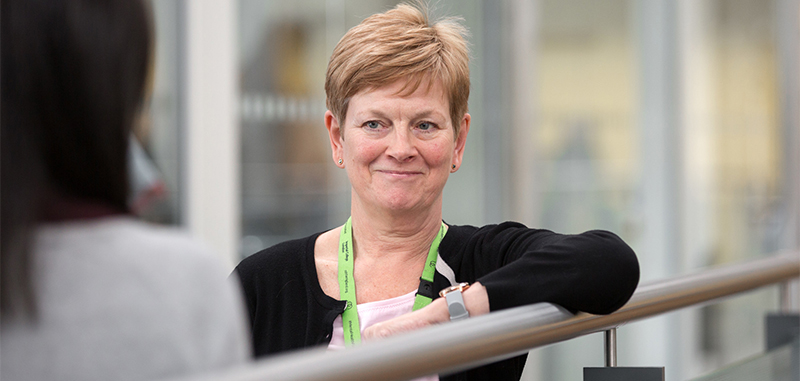
We spoke to MHFA Instructor and Faculty Centre Safety Compliance Manager Sally Campbell about the course, and why the College needs more Mental Health First Aiders.
What first motivated you to become a Mental Health First Aider?
I have crossed paths with quite a few people experiencing mental health issues, both at work and outside of work. Sadly, not all have received the help that they needed and the subsequent outcomes for them have not been good. I felt that I needed to be more knowledgeable about mental health so that I could understand and perhaps help. The Mental Health Lite course seemed to be the perfect fit for me at the time. Having done the course, I realised that I wanted to know more and so enrolled on the 2-day MHFA training to become a Mental Health First Aider.
How did you make the move into being a MHFA instructor?
Funding was found to train more MHFA instructors in College as there was a desire to increase the amount of training that could be offered in-house. A request for potential trainees was sent to Faculties and I applied. I was shortlisted and attended interview, following which I was delighted to be given a place on the instructor course, which I really enjoyed. Though a bit daunting, the highlight of instructor training was meeting some of the people who feature in the MHFA training video clips and hearing about their life experiences. It brings it all to life.
What does the MHFA training entail?
It’s a 2-day course. It’s not about being a counsellor, diagnosing conditions or offering advice – it is just like physical first aid in that respect. It’s meant to offer immediate help, provide comfort, reassure and promote recovery. The course covers different types of mental health issues, how to spot the early signs of a problem, and importantly how to provide help on a first aid basis and guide people towards the right support, which is vital to assisting a faster recovery. The course teaches trainees how to be more confident at approaching and helping someone, how to really listen to what they are saying without being judgemental, and how to help reduce the stigma surrounding mental health. Trainees also learn how to look after their own mental health.
Who should attend the course?
It’s suitable for everyone. Many of us will know someone who is dealing with mental health issues, but we don’t all understand what they are going through or know how we could help. It is particularly useful for anyone working with students or managing teams. I feel it is something we should all be more knowledgeable about.
Why do you think it’s important for us to have a network of Mental Health First Aiders across the College?
Incidences of mental health problems are rising generally in the population, and significantly with students and academics. The most useful immediate thing we do for anyone experiencing mental health issues is to offer them someone supportive to talk to. We are not taught how to listen and our listening is not always non-judgemental. Having a network across the whole of College – in teaching, support and research – means that everyone has access to someone when they need them, and that this person is trained to listen non-judgementally and help guide them to the right support.
What do you think is the most rewarding thing about being a Mental Health First Aider?
Having the confidence to know what to say and to be able to help someone is a great feeling, and it doesn’t really take that much to make a difference. It’s lovely to hear someone tell you that you have really helped them.
If you could say one thing to convince someone who’s considering undertaking the training, what would it be?
Go for it! It’s an enjoyable course and you will come away knowing what to do if a work colleague or someone you know needs help. There’s a whole network of MHFAs in College that you can turn to if you need support yourself in your new role, so don’t be afraid to jump in and do it.
To find out more about Mental Health First Aid training, visit https://www.imperial.ac.uk/equality/support-for-staff/training/mhfa/